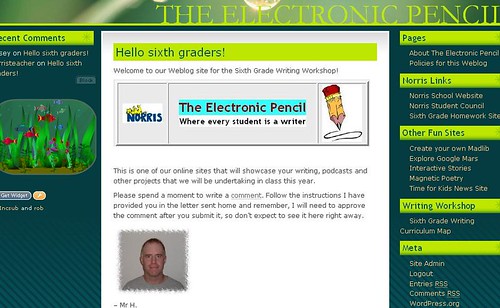This is a fun little quiz to see how addicted you are to blogging.
Here is how I turned out:

Yikes!
Peace (in 7 steps),
Kevin
This is a fun little quiz to see how addicted you are to blogging.
Here is how I turned out:

Yikes!
Peace (in 7 steps),
Kevin
I think my transformation from the old Manila blog platform to Edublogs (wordpress) is complete now that I have set up a classroom blog for my incoming sixth graders. I even added a cute little fishbowl widget to the site. In my annual letter of welcome, I have encouraged my students to post a quick hello message to our writing community (and asked parents to visit, too), and this morning, I moderated the first three student posts.

It’s nice to have everything on one platform and I continue to love Edublogs for all of its options and security and simplicity. I have written before about my move away from Manila for all of our sites at the Western Mass Writing Project, but I still had my classroom site out there. This makes the transformation complete.
Peace (with new platforms),
Kevin
I recently finished reading Dave Egger’s What is the What — a harrowing and yet ultimately uplifting fictionalized true story of one of the Lost Boys of Sudan. It really is a fine novel and you should run out and get it right this second. The What in the title refers to an ancient tale of the main character’s village in which the original people were asked to choose between a world of food and shelter, and the unknown, the What. They chose the world of food and shelter, and spent the rest of their days wondering what is the What that they missed out on, considering the violence and sadness of this world.
Inspired by the book, I wrote this poem for my One Poem Every Month for a Year project and thought I might try it as a spoken word/music piece with my Looper software. It is a slightly strange production, I’ll admit right upfront.
What is the What
August 2007
Listen to the PoemWhat is the What
is what the question is
What is the What
is what the question is
What is the What?
What is the What?
What is the What
is what the question isWhat is the What
is what the question is
that takes us back in time
to the choices faced by our ancestors
whose voices climb up through the past
and whose ideas are marred by the
two diverging paths
and we live in this aftermath
of not attaining the What, which is the unknown,
the unspeakable,
since what was clearly decided at the start of the world
was to take this place as we see it today —
with animals for food
with walls for shelter
with family for survival
and to steer clear of the other — the What —and what is the What is the question
that haunts us even to this day because
we came away with all of the above — yes, even love —
but also pain and hurt,
and death, destruction, violence,
such hatred inside of us that there are those of us
who spend the days, asking ourselves,
pleading with our Gods,
murmuring to the well of the world,
wondering,
what is the What
and where has it gone
and why didn’t those poor souls choose the unknownalthough
if truth be told
who can blame them
when all they wanted was to behold a land that held
food for empty bellies
and a room to escape the rains and the bone-chilling cold
and they weren’t thinking that the other road — the What —
might hold something truer, deeper,
more spiritual than this, this …
space of dead dreams.
So what is the What is what sinks below the surface
and drives us forward, even today,
toward something we can’t hold in our hands
can’t take it for granted
can’t understand how we got planted here
without the What
and yet, you can approach it —
move towards it —
when you consort with others of a similar mind
to try to find some kind of balance
between the world we were given
and the world, denied.What is the What
is what the question is
What is the What
is what the question is
What is the What?
What is the What?
What is the What
is what the question is
Peace (in the unknown),
Kevin
A blogging friend — Alice Mercer — interviewed another friend — James Farmer, creator of Edublogs — for her Webcast Academy show. Nice job, Alice! And James seemed like a wonderful guest to have on her show (called Alice’s Restaurant).
It’s great to see people making connections everywhere. Their discussion centers on the future of teaching and conversations that have been sparked over at Will Richardson‘s blog.
Take a listen to Alice and James.
Peace (in podcasts),
Kevin
So I didn’t win anything with the Four Slides contest, but that wasn’t the point (right?). It was an interesting experience just to narrow down who you are into four little pieces, and I will use my slideshow with my students.
Still, some of the entries were pretty creative and interesting (and people spent way more time than I did, that’s for sure). I like the entire montage effect and the different approaches that people took. Very cool. (Mine looks kinda blah compared to the rest)
Check it out at the Dy/Dan site when you get a moment.
Peace (in four pieces),
Kevin
My tank is a bit on empty right now — it might be the slew of things I know I need to get done and get together before the start of school or it might just be that I have written myself out and need to rejuvevate the brain.
Still, the poems come.
Here is one I wrote as I thought about how to write a poem when you don’t have anything to write about (meta-poetry?).
What to do with Words
August 2007
Listen to the PoemThey say this “writing a poem” thing is just too difficult to do
so I just wait for the words,
kick back and hope for the best
and sometimes this slacker tendency actually works —
the words come fluttering by, on an arc before the eyes,
and patience here is the key —
don’t grab too soon
or you will be stuck with a net that has holes in it
with nothing gained, and everything lost,
while the best words will have gotten away.
The most obvious ones are often the least creative creatures
since they situate themselves so easily in front of your eyes —
no, the ones you want are crafty and sly,
and nuanced and covered in something like quicksilver —
the timing is everything if you want to find truth
so it helps to just stop thinking
just stop yourself cold right where you are before your brain
gets you in trouble,
and then, there before you, if the time is right
if the forces are converging
if the words are feeling frisky
the poem’s pieces will hover and take shape,
although what it all means as you take these gifts in the palm of your hand
and feel the warmth of words, well, that, my friend, that
is a complete mystery even to me.
Peace (in words),
Kevin
Charles Hodgson, over the Podictionary, has uncovered and made visible the origins of the word “book” in a recent podcast and it is fascinating (as his information almost always is). 
For example:
“When the word book first appears in the written record the dates are pretty early in Old English. This means that book itself was a book. What I mean by that is that although you think of a book as something with pages bound between covers, the earliest Old English meaning of book was anything at all written down, so the act of writing down the word book itself created a book.“
Go to Podictionary and listen for yourself. Or listen here.
Peace (with words),
Kevin
I was following Alice’s blog site, when she mentioned a “contest” over at the dy/dan blog in which people are asked to create a no-frills elevator pitch using slides (no video, no audio, no animation, etc). After reading through Alice’s variations of work, I decided to craft one myself, thinking of my students as my audience. Four slides …. not much room to work and forces you to get to the essence of your message.
But here it is:
[slideshare id=88903&doc=just-who-am-i-anyway3325&w=425]
Peace (in four pieces),
Kevin